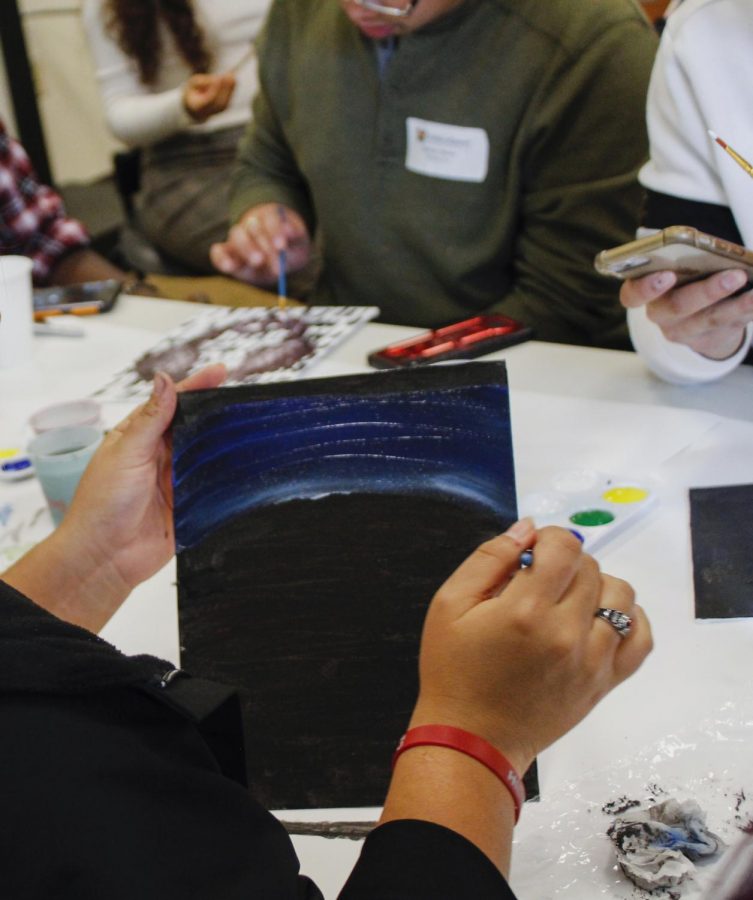‘We feel like we aren’t necessarily wanted’
Students attend fourth annual UndocuQueer conference in Seattle
A WSU student paints a gradient at the UndocuQueer Conference on Saturday afternoon at the UW Samuel E. Kelly Ethnic Cultural Center in Seattle.
October 14, 2019
Editor’s note: Two people interviewed in this article were not named to protect their privacy and safety as undocumented students.
A WSU student used a paintbrush to create wide strokes of blue across a painted-black canvas, eventually switching her color palette to include purple, red and orange strokes to make a rainbow gradient. She had written down her insecurities on the canvas before she painted it black.
This was only one of the workshops offered at the annual UndocuQueer Conference on Oct. 12 in Seattle. The conference was for college students, administrators and faculty to discuss issues facing undocumented and queer students.
WSU and the University of Washington collaborated for this conference, said Magdalena Fonseca, director for the UW Samuel E. Kelly Ethnic Cultural Center.
Since the 2016 presidential election, many underrepresented students and undocumented students are seeing more discrimination and harassment, Fonseca said.
As a result, student affairs practitioners are looking at how to address those issues with counter-programming, such as the UndocuQueer Conference, to show support, Fonseca said.
One WSU student who went to the conference is both undocumented and part of the LGBTQ+ community.
She said she thinks the conference showed people who are either undocumented or part of the LGBTQ+ community that both groups are similar in many ways.
They both go through discrimination, fear rejection and must learn how to embrace themselves, she said.
However, both groups have different fears, she said.
People who are solely from the LGBTQ+ community are not scared of being deported, and people who are solely undocumented are not afraid that their family may not accept them, she said.
As a freshman, she is part of the first class of students to enter college since Deferred Action for Childhood Arrivals (DACA) went into effect and is ineligible to apply for the program, she said.
She said she feels like people forget that there are people who do not have DACA.
“We feel like we aren’t necessarily wanted at some times,” she said.
She went to the conference because she wanted to embrace who she is and find comfort in both the undocumented and LGBTQ+ communities, she said.
Another undocumented student from WSU said she had been afraid to share that she is undocumented.
“I suppressed it for the longest time,” she said. “It was just something I ignored.”
She did not realize going to a college other than a community college was an option for her until she was in her last year of high school, and people told her that it was possible.
The reason she came to WSU was because of the people at the school who help undocumented students and provide them with resources, she said.
Out of all the workshops offered at the conference, she said she looked forward to the painting workshop the most because it was a way to turn something ugly into something beautiful.
The painting session helped people realize that they may not be over certain experiences that have happened to them, and those experiences have become part of them, said Linda Vargas, one of the leaders of the workshop and ambassador for Undocumented Initiatives.
However, Vargas said, they can choose whether those experiences tear them down or make them stronger.
The conference also included many other workshops, ranging from how to be an LGBTQ+ ally to how to support undocumented students to mental health.
Keynote speaker Catalina Velasquez, UW Ph.D. student in the Department of Gender, Women & Sexuality Studies, talked about the number of transgender women of color who have been murdered.
So far this year, at least 18 have been murdered, she said, and nothing has been done about it.
“Black trans lives matter, and trans lives are often seen as disposable,” she said.
She said there are about one million LGBTQ+ immigrants in the United States. 267,000 of those people are also undocumented. Yet many undocumented groups do not welcome those who are part of the LGBTQ+ community and vice versa.
“Immigrant justice is Black Lives Matter. Immigrant justice is LGBTQ rights,” she said.















